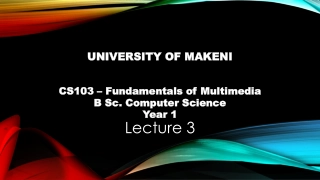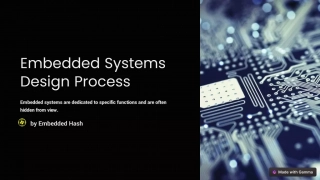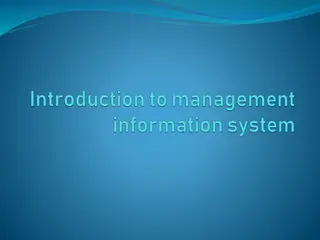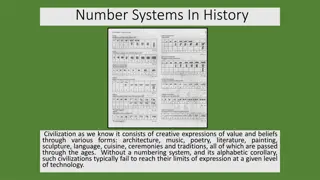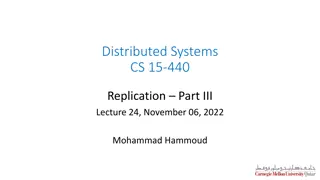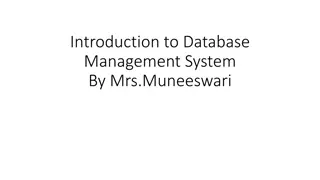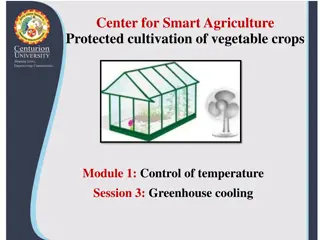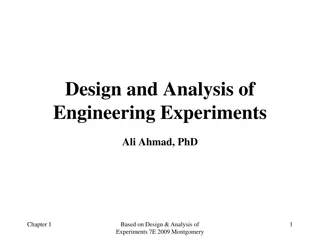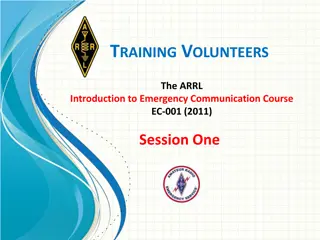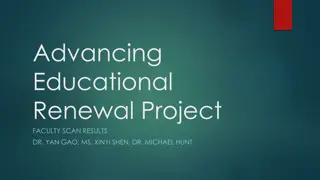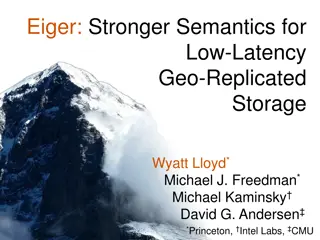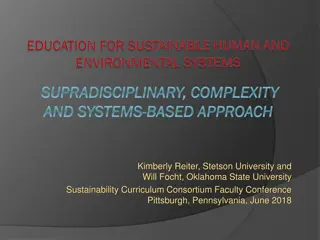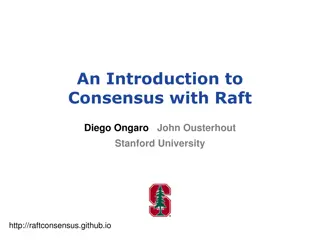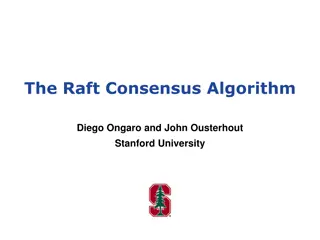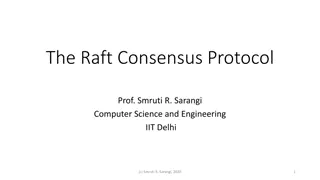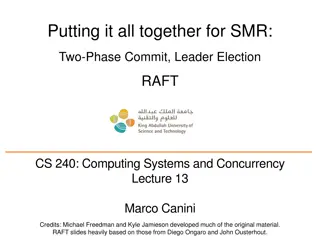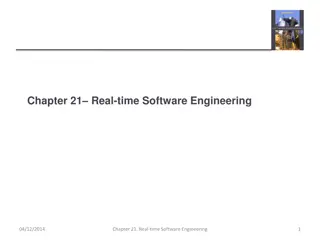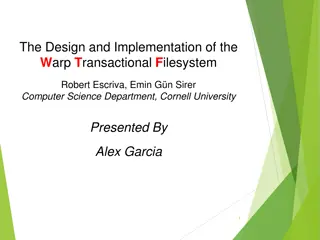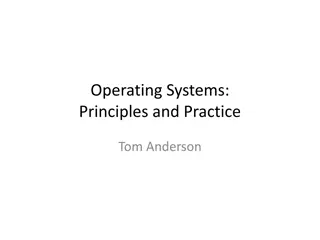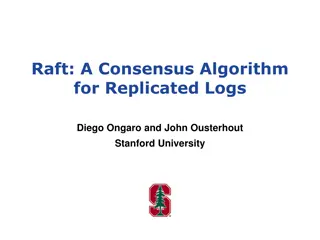Enhancing Food Systems for Improved Food Security and Job Creation
The importance of improving food systems to achieve sustainable development goals and enhance food security and job creation. It covers topics such as the current food systems, the impact of these systems, jobs in the food systems value chain, and key recommendations.
8 views • 24 slides
Understanding Multimedia Systems: Hardware and Software Components
Multimedia systems require specific hardware and software components to meet the demands of producing and playing multimedia content. Development systems are used for creating content with higher specifications, while playback systems are used for playing multimedia files with lower specifications.
8 views • 46 slides
Embedded Systems Design Process in the Embedded systems
Embedded systems are all around us, from the tiny microcontrollers in our household appliances to the sophisticated control systems in cars and aeroplanes. But how are these systems designed? Let's delve into the basics of the embedded systems design process in simple terms that anyone can understan
2 views • 9 slides
Overview of Distributed Systems: Characteristics, Classification, Computation, Communication, and Fault Models
Characterizing Distributed Systems: Multiple autonomous computers with CPUs, memory, storage, and I/O paths, interconnected geographically, shared state, global invariants. Classifying Distributed Systems: Based on synchrony, communication medium, fault models like crash and Byzantine failures. Comp
9 views • 126 slides
Operating Systems
An operating system is a crucial program that manages all other programs on a computer. It handles tasks like input recognition, file management, and device control. There are different types of operating systems such as single-user, single-task systems, multi-user, multi-task systems, real-time ope
6 views • 11 slides
Understanding Information Systems in Organizational Management
Management in organizations is divided into three levels: operational, tactical, and strategic. Each level requires different information systems to support various activities. Operational systems focus on routine transactions and control processes, while middle-level systems aid in semi-structured
9 views • 39 slides
Understanding Negative Results in Systems Research
Systems research encompasses various areas such as operating systems, networking, and distributed systems. Negative results in systems research often go unpublished, leading researchers to focus on curating positive outcomes. This practice can hinder the credibility of scientific findings and impede
5 views • 23 slides
Explore the Top 5 Trends in Alarm Systems with Shellharbour Security Systems
Explore the latest trends in alarm systems with Shellharbour Security Systems. Learn about advancements such as smart home integration, wireless technology, AI-powered monitoring, and more. Stay informed to enhance your home or business security with cutting-edge solutions. Visit: \/\/shellharbourse
7 views • 8 slides
Understanding Management Information Systems (MIS)
Management Information Systems (MIS) are vital for collecting, processing, and analyzing data in business activities. They assist decision makers, facilitate communication, and maintain records. Components include people, data, business procedures, hardware, and software. Various types of informatio
2 views • 11 slides
IMPACT INVESTING CHALLENGE 2024
Addressing the gender-climate nexus, our team's investment proposal focuses on empowering women in sustainable finance initiatives. We highlight the investment target, business model, and how our solution tackles gender inequalities within climate finance. Our implementation plan emphasizes commerci
4 views • 6 slides
Number Systems In History
Civilizations throughout history have expressed their values and beliefs through various creative forms like architecture, music, and literature. The development of numbering systems played a crucial role in advancing society's ability to communicate, track records, and engage in trade. From the ear
1 views • 17 slides
Achieving Student Success through ASAP Programs
Accelerated Study in Associate Programs (ASAP) provides comprehensive academic and wraparound support to remove barriers for students, ensuring they can focus on their education. With a proven track record of student success based on data and research, ASAP offers various benefits including tuition
1 views • 14 slides
Understanding Consistency Protocols in Distributed Systems
Today's lecture covers consistency protocols in distributed systems, focusing on primary-based protocols and replicated-write protocols. These protocols play a crucial role in ensuring consistency across multiple replicas. One example discussed is the Remote-Write Protocol, which enforces strict con
0 views • 35 slides
Introduction to Database Management System Explained
This presentation covers the basics of database management systems, including definitions of data, types of data, structured and unstructured data, storing data in computers using file systems and database systems, and issues with file systems like data redundancy, inconsistency, difficult data acce
1 views • 18 slides
Understanding Different Types of Recommender Systems
Recommender systems play a crucial role in providing personalized recommendations to users. This article delves into various types of recommender systems including Collaborative Filtering, Content-Based, Knowledge-Based, and Group Recommender Systems. Collaborative Filtering involves making predicti
0 views • 7 slides
Efficient Greenhouse Cooling Systems for Smart Agriculture
Active summer cooling systems like fan-and-pad and fog systems are crucial for maintaining optimal temperatures in greenhouses. These systems work by utilizing evaporation to remove heat from the air. Fan-and-pad cooling systems have been in use since 1954, where water is passed through pads to cool
1 views • 23 slides
Design and Analysis of Engineering Experiments in Practice
Explore the fundamentals of engineering experiments, including blocking and confounding systems for two-level factorials. Learn about replicated and unreplicated designs, the importance of blocking in a replicated design, ANOVA for blocked designs, and considerations for confounding in blocks. Dive
0 views • 15 slides
Top 10 Dream11 Alternatives Generating Million Dollar Revenue
Numerous Dream11 Clone have surged in the fantasy sports market, achieving substantial revenue through replicated gameplay mechanics and diverse sports offerings. These platforms captivate a broad audience, monetizing through entry fees and strategic
4 views • 1 slides
Understanding Emergency Communication Systems for Volunteer Training
This content covers various topics related to emergency communication systems for volunteer training, including agency communication systems, government radio systems for police and fire departments, emergency medical radio systems, American Red Cross frequencies, and types of served-agency radio sy
2 views • 29 slides
Introduction to Embedded Systems Design
Embedded Systems Design, Chapter 1 provides an insightful overview of embedded systems, distinguishing them from general-purpose computers. The chapter delves into the characteristics of embedded systems, their design considerations, and the various types of embedded computers such as general-purpos
1 views • 7 slides
Raft Consensus Algorithm Overview for Replicated State Machines
Raft is a consensus algorithm designed for replicated state machines to ensure fault tolerance and reliable service in distributed systems. It provides leader election, log replication, safety mechanisms, and client interactions for maintaining consistency among servers. The approach simplifies oper
0 views • 32 slides
Analysis of Faculty-wide Educational Renewal Project Results
Results from a faculty-wide scan of courses in an educational renewal project reveal the distribution and emphasis on various research domains, knowledge, literacy, and skills among faculty members. The analysis includes percentages of courses covering research types, technical skills, communication
0 views • 7 slides
Information Systems in Organizations: Overview and Implementation
Information systems play a crucial role in organizations, encompassing transaction processing systems, functional area information systems, and enterprise resource planning systems. This content delves into the purpose of transaction processing systems, the support provided by information systems ac
0 views • 30 slides
Stronger Semantics for Low-Latency Geo-Replicated Storage
Discusses the importance of strong consistency and low latency in geo-replicated storage systems for improving user experience and revenue. Various storage dimensions, sharding techniques, and consistency models like Causal+ are explored. The Eiger system is highlighted for ensuring low latency by k
0 views • 24 slides
Understanding Cascade Control Systems in Industrial Processes
Cascade control systems play a crucial role in improving process control efficiency by incorporating feedback loops within feedback loops. This type of control architecture helps to better handle disturbances and variations in the process by creating secondary loops that monitor specific parameters.
0 views • 8 slides
Verifying Functional Correctness in Conflict-Free Replicated Data Types
Explore the significance of verifying functional correctness in Conflict-Free Replicated Data Types (CRDTs), focusing on ensuring data consistency and program logic for clients. Learn about the importance of Strong Eventual Consistency (SEC) and the necessity of separate verification with atomic spe
0 views • 33 slides
Sustainable Education for Human and Environmental Systems
Sustainable Education for Human and Environmental Systems (SHES) focuses on fostering sustainable societies through social learning and systems thinking. It aims to promote interconnectedness between human and environmental systems, with a vision of enhancing well-being while maintaining the viabili
0 views • 19 slides
An Introduction to Consensus with Raft: Overview and Importance
This document provides an insightful introduction to consensus with the Raft algorithm, explaining its key concepts, including distributed system availability versus consistency, the importance of eliminating single points of failure, the need for consensus in building consistent storage systems, an
0 views • 20 slides
The Raft Consensus Algorithm: Simplifying Distributed Consensus
Consensus in distributed systems involves getting multiple servers to agree on a state. The Raft Consensus Algorithm, designed by Diego Ongaro and John Ousterhout from Stanford University, aims to make achieving consensus easier compared to other algorithms like Paxos. Raft utilizes a leader-based a
0 views • 26 slides
Understanding the Raft Consensus Protocol
The Raft Consensus Protocol, introduced by Prof. Smruti R. Sarangi, offers a more understandable and easier-to-implement alternative to Paxos for reaching agreement in distributed systems. Key concepts include replicated state machine model, leader election, and safety properties ensuring data consi
0 views • 27 slides
Fault-Tolerant Replicated Systems in Computing
Overview of fault-tolerant replicated state machine systems in computing, covering topics such as primary-backup mechanisms, high availability extensions, view changes on failure, leader election, and consensus protocols for replicated operations. The content emphasizes the importance of leaders in
0 views • 38 slides
Understanding DNA Replication Process in Living Organisms
DNA replication is a fundamental biological process where an original DNA molecule produces two identical copies. This process involves initiation, elongation, and termination stages, utilizing replicator and initiator proteins. The DNA is unwound and replicated with the help of enzymes like helicas
0 views • 16 slides
Family Centered Services of CT: Empowering Youth through TOP Sessions & Community Service
Family Centered Services of CT, led by Executive Director Cheryl Burack, offers a nationally-replicated youth development program focusing on teen pregnancy prevention and academic success. Through TOP Sessions, 15-17-year-olds engage in guided discussions, community service learning, and individual
0 views • 8 slides
Understanding Embedded Systems and Cyber-Physical Systems
Embedded systems are specialized computer systems embedded within larger systems, such as control systems and car controllers. This lecture covers real-time aspects, applications of Cyber-Physical Systems (CPS), and examples like the Boeing 777/Airbus A380 cockpit. It discusses the design process of
0 views • 22 slides
Understanding Real-time Software Engineering for Embedded Systems
Embedded systems play a crucial role in controlling various machines and processes. Real-time software engineering focuses on designing systems that respond instantly to events, ensuring correctness and timeliness. Characteristics like continuous operation, unpredictable environment interactions, an
0 views • 59 slides
The Design and Implementation of the Warp Transactional Filesystem
The Warp Transactional Filesystem (WTF) offers a new distributed filesystem design focusing on strong guarantees and zero-copy interfaces. It introduces the concept of file-slicing abstraction to enhance application performance, scalability, and transactional operations. The WTF architecture compris
0 views • 16 slides
Quantum Distributed Proofs for Replicated Data
This research explores Quantum Distributed Computing protocols for tasks like leader election, Byzantine agreement, and more. It introduces Quantum dMA protocols for verifying equality of replicated data on a network without shared randomness. The study discusses the need for efficient protocols wit
0 views • 28 slides
Understanding Operating Systems: Principles and Practice in CSE Curriculum
Dive into the world of operating systems through the lens of "Operating Systems: Principles and Practice" by Tom Anderson. Discover how this course fits in the UW CSE curriculum, covering systems programming, operating system interfaces, and distributed systems. Explore the project work on building
0 views • 21 slides
Understanding Standard Deviation and Standard Error of the Means
Standard deviation measures the variability or spread of measurements in a data set, while standard error of the means quantifies the precision of the mean of a set of means from replicated experiments. Variability is indicated by the range of data values, with low standard deviation corresponding t
0 views • 7 slides
Raft: A Consensus Algorithm for Replicated Logs Overview
Raft is a consensus algorithm developed by Diego Ongaro and John Ousterhout at Stanford University. It aims to ensure replicated log clients and consensus modules maintain proper log replication and state machine execution across servers. Raft utilizes leader election, normal operation for log repli
0 views • 31 slides

